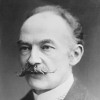“ A man's nature, for example, is constituted by his memories and the rest of his knowledge, by his loves and hatreds, and so on; thus, but for the objects which he knows or loves or hates, he could not be what he is. ”
Bertrand Russell, The Problems of Philosophy (1912). copy citation
| Author | Bertrand Russell |
|---|---|
| Source | The Problems of Philosophy |
| Topic | memory love |
| Date | 1912 |
| Language | English |
| Reference | |
| Note | |
| Weblink | http://www.gutenberg.org/files/5827/5827-h/5827-h.htm |
Context
“It is held that whatever has relations to things outside itself must contain some reference to those outside things in its own nature, and could not, therefore, be what it is if those outside things did not exist. A man's nature, for example, is constituted by his memories and the rest of his knowledge, by his loves and hatreds, and so on; thus, but for the objects which he knows or loves or hates, he could not be what he is. He is essentially and obviously a fragment: taken as the sum-total of reality he would be self-contradictory.
This whole point of view, however, turns upon the notion of the 'nature' of a thing, which seems to mean 'all the truths about the thing'.”
source


